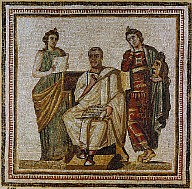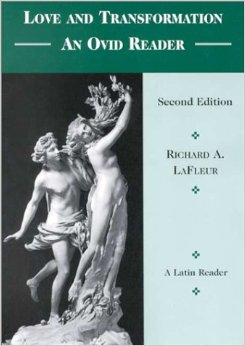
LOVE AND TRANSFORMATION
An Introduction to Ovid
Dr.
Richard A. LaFleur Recipient of the 2013 ACTFL Papalia Award for Excellence in Teacher Education |
|
Welcome to the website for my tutorial, "LOVE AND TRANSFORMATION: An Introduction to Ovid"
SALVETE, VOS OMNES!! This is the site for my online tutorial on the Latin poet Publius Ovidius Naso, aka "Ovid." I am now offering this class, which I previously taught as a formal academic course for many years through a fruitful collaboration between the University of Georgiaís Department of Classics and Department of Independent and Distance Learning, as an independent self-paced tutorial for adult learners with a strong background in Latin (including at least completion of WHEELOCK'S LATIN or an equivalent introductory curriculum) who desire an introduction to Ovid's epic poem of mythological transformations, the METAMORPHOSES, and his spritely, tongue-in-cheek love poetry, the AMORES.
If you think you may be interested in applying for this course of study, you should first read the Tutorial Overview here and then email me for further information.
Each of my tutorials is asynchronous, meticulously organized, and highly personalized; a customizable rapid refresher using WHEELOCK'S LATIN 7th Ed. and the Wheelock companion reader SCRIBBLERS, SCVLPTORS, AND SCRIBES, for those whose grammar and reading/translation skills may be a bit rusty, can be arranged as an add-on or a preamble to the Ovid tutorial.
R. A. (“Rick”) LaFleur, aka Doctor Illa Flora
TESTIMONIA
I truly have had a wonderful time with this course and am really glad I did it. It has been eye-opening for me in many ways. As I mentioned before, I didnít realize how amusing and witty Ovidís work would be. Most of the time, we think of the ancients as pretty staid and serious folks, but Ovid has shown me a completely different side of things. I also didnít know just how influential Ovidís work has been throughout the ages.
I have of course also had a great opportunity to improve my Latin. I remember struggling to unwrap the grammar in verses in the first lessons on Daphne & Apollo, but I had much easier going in the last few lessons!!
I also learned a lot about scansion and meter. I must have learned something about scansion in high school Latin, but I had long forgotten it all. Learning that has been insightful for me. The fact that Ovid had to fit his art into a strict metrical format makes it that much more impressive. It also made me think more about poetry and meter I have encountered in other languages I have studied, and in English.
The course has been great. I have been delighted to work with you, professor, and I really appreciate your positive encouragement and valuable feedback. I have come to have a frisson of excitement when I get your responsa on my assignments back and see the e-mail in my inbox.
Jonathan L., fund portfolio managementThis tutorial has opened up the realm of poetry to me--I was never much interested. For the first time this week, I actually looked at a poem in the New Yorker. I had always skipped over them. Can't say I have much feel for contemporary poetry, but I will say that I now have a nascent interest--though I will stick to Ovid for the moment.
The interest in words/sounds/poetry (and even my own written word) is truly new to me. I have printed out a primer on the emotional impact of consonantal sounds. I don't think yet that they really touch me--but I am trying to learn to hear what Dr. LaFleur hears....
We went to the Met yesterday and while we were waiting in line, we were in the Rodin Hall, and lo and behold--both Cupid and Psyche AND Pygmalion and Galatea. As I looked at the statues, I felt somehow like they were old friends, as if I had a connection to the marble. I suppose Ovid would have liked that: it was a revelatory moment.
Judith E.I think I can say that the tutorial's first reading, "Daphne and Apollo," has been quite enjoyable and not too much for me while still presenting considerable (but surmountable) challenges.
Stephen L., computer game designerThis class has been such a pleasure for me; it is a privilege to have one-on-one communication about Latin with an elite scholar and extraordinary teacher. Here were the most rewarding aspects of the course, in no particular order:
1) Learning the structure of Latin poetryóBefore this course, I had little to no understanding of dactylic hexameter or elegiac couplet. I now have a great deal of confidence in my knowledge of Latin poetry, and I have really enjoyed learning all the things that Latin poets could achieve with sound effects and word pictures that are much more difficult in English poetry!
2) Deeper understanding of literature in general and poetry specifically—I really enjoyed that this class was not just translation, but that it required thinking deeply about the messages that the author is communicating to the world and understanding the important relationship between form and content. This class has made me a better teacher and student of literature. I loved the Metamorphoses particularly, and I’m hoping to teach it to a group of high schoolers next year!
3) Feedback about my translation and answers to discussion questions—It was incredibly valuable to receive detailed corrections to my translations and explanations to any questions that I have asked. I always felt that my questions would not be frustrating or tedious, but that they were viewed as an important part of my learning process. In short, this class has reinforced that good communication in a healthy-student teacher relationship can shape a student’s engagement with the subject.
Hannah Kelley, teacher
Generally speaking, I learned better to understand and appreciate Latin poetry. Before Dr. LaFleur's Ovid tutorial, Latin poetry was intimidating to me. I could not wrap my head around the word order, meter, and abundance of vocabulary. While I still have to consult the dictionary often when reading, I have learned to see the beauty in a poetís choices regarding word order, meter, and vocabulary. In my opinion, Ovid is an excellent place to start when learning Latin poetry because his cleverly crafted verses contain so much meaning and provide so much opportunity for analysis and discussion.
To be more specific, I am thankful to now be able to read several long sections from Ovidís Metamorphoses and Amores,and to be able to share these with my students. I plan to create tiered versions of these stories and poems in order to make them more accessible to my students. My deepened knowledge of these poems gives me the ability to do that, while I would not have been able to do so as efficiently a year ago. Furthermore, I have learned not only how to scan Latin poetry, but to read it expressively in the correct meter without thinking about the scansion. Because there is a rhythm to Latin poetry that one can assimilate after just a short time, I no longer think about the ďrulesĒ of scansion. This has been great fun for me, and I hope to share this as well with my students.
A valuable feature of the tutorial is the guided commentary throughout the book. I found it to be the perfect balance between explaining potentially confusing vocabulary and grammar, providing context for allusions and historical information, and pointing out interesting and delightful things I might otherwise have missed. It is truly like having a teacher right there with you while you read. I also found the discussion questions to be extremely fruitful for my learning. They are thought-provoking and relevant to the text, and provide an excellent model for the sorts of questions I can ask my own students about poetry. Another surprisingly valuable feature of the tutorial is the Sara Mack book on Ovid. I absolutely loved this book. Clearly, Mack adores Ovid, and this adoration is contagious. I finished her book excited to read more Ovid beyond this tutorial and more aware of how Ovid expresses his genius.
This tutorial has made Ovid my favorite Roman author. I will certainly teach Ovid to my students as I continue to read more of his work on my own time. I am thankful to Dr. LaFleur for writing such an excellent tutorial and helping me along the way.
Ovidius iam vivit!
John Hermesmann, teacher
| TOP OF DOCUMENT |
Last updated 11/24. Please report any problems with this website to lafleur922@hotmail.com
